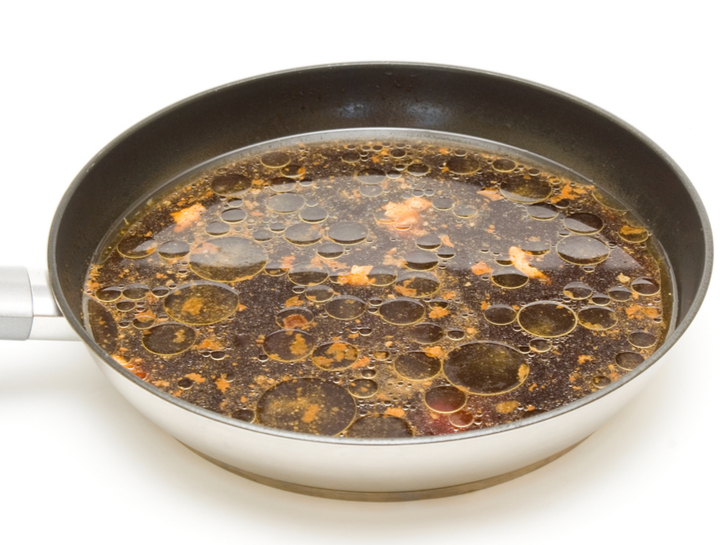Most cooks have encountered the problem of dealing with remnants of cooking oil. After making anything from a pound of bacon to a batch of hand-cut french fries, you are left with a significant amount of leftover grease and oil to discard. But how are you supposed to get rid of it?
Pouring the oil down the sink, whether hot or cold, is a terrible idea. Many home drain pipes are made out of PVC, which is a type of plastic that cooking oil can easily create holes in. Room temperature or cold oil can also congeal in drain pipes, causing clogs.
Some cooks pour their used oil in the garbage, hoping that the accumulated trash will absorb the mess. While that tactic might work if your garbage is stuffed with paper towels, for the most part the oil will slide off everything and pool at the bottom of the bag. If it’s still hot, the fat will melt right through the thin plastic.
Before you melt your kitchen garbage bags with hot fat or clog your drains with grease, check out these tips on what to do with your used oil.
Understand The Different Kinds Of Cooking Fat
For solving the disposal problem, we can break cooking fat down into two categories: fat that is solid at room temperature, and fat that remains liquid whether hot or cool. Room temperature solid fat includes butter, lard, bacon grease, coconut oil, palm oil and shortening. Liquid room temperature fat includes most cooking oils, such as canola, peanut, corn and olive oil.

Joe Gough/Shutterstock
Disposing Of Room Temperature Solid Fat
You always want to let your cooking oil cool a bit before you attempt to handle it, and room temperature solid fat will be much easier to handle. Hot oil can cause burns, fires and melt containers. Before the fat becomes completely cool,pour the grease into an appropriate container such as a metal coffee can. After containerized, wait until the grease is fully cooled and place it in the trash.
Handling Liquid Room Temperature Oil
Oil that remains liquid at room temperature is a little trickier to handle than solid fat because it can be messier. Like when disposing of the solid kind, you want to let the oil cool before handling it. You can refrigerate liquid fat to speed up the cooling process. Once cool, find a metal or sturdy paper container. Again, a coffee can works for this — and because you are not touching the oil until it’s room temperature, you can use a plastic can. Cover the top securely, place in its own garbage bag, tie it shut and throw it out in the trash. Do not merely pour the oil into your kitchen garbage. Not all trash bags are mean to be leak-proof, and oil spills in the kitchen are dangerous and very difficult to clean.

Consider Reusing When Possible
Cooking oil, especially the kind used for deep frying, can be reused in certain circumstances. Even the finest restaurant doesn’t replace its deep fryer oil every day, and restaurants put a lot more food through their fryers than a home cook ever will. Let your cooking oil cool, then repurpose old glass jars, such as pasta sauce containers, to hold the used oil or grease. You can store bacon fat in the fridge and use it for frying potatoes or sauteing vegetables to add a smoky flavor. Other animal fats, such as lard or duck fat, can also be reused for sauteing.
When you reuse frying oil, it is best if you continue to use it for frying similar items. If you make homemade french fries and are left with a quart of oil, you can reuse it the next time you cook fries. To check that used oil is still good to use, give the cooled oil a smell test. If it smells like burned potatoes or a bit like crayons, then discard it. Otherwise, strain it through cheesecloth or a coffee filter into a sturdy container, such as a glass jar, and keep it in the refrigerator until you’re ready for your next deep fry. However, you should avoid using old oil in baking — unless you want your brownies tasting like fried chicken.For non-culinary uses, you can make a small oil lamp or a candle out of used cooking oil.
Some cooking fats should not be reused, such as butter. While butter has too low a smoking point for deep frying and is typically consumed with the item you’ve cooked, some recipes call for poaching items in butter. The resulting leftover butter should be chilled and discarded.

Cooking Oil Recycling
Restaurants eventually change their deep fryer oil, and when they do so, many call on a company to come pick up their used oil. These companies, including DAR PRO Solutions and Envirotek, recycle the used grease to create biodiesel fuel. Though many of these companies typically service restaurants, if can find a local one you can call and see if they will pick your oil up from your home as well. However, that service isn’t an option in some cities.
Avoid The Problem In The First Place
If these solutions sound burdensome, you can avoid using the massive amounts of oil that are required for deep frying. Good oil isn’t cheap, and cheap oil may not be healthy, so try cooking without it as a solution. Oven broiling and roasting is an effective way of cooking foods and avoiding the messy frying process.
